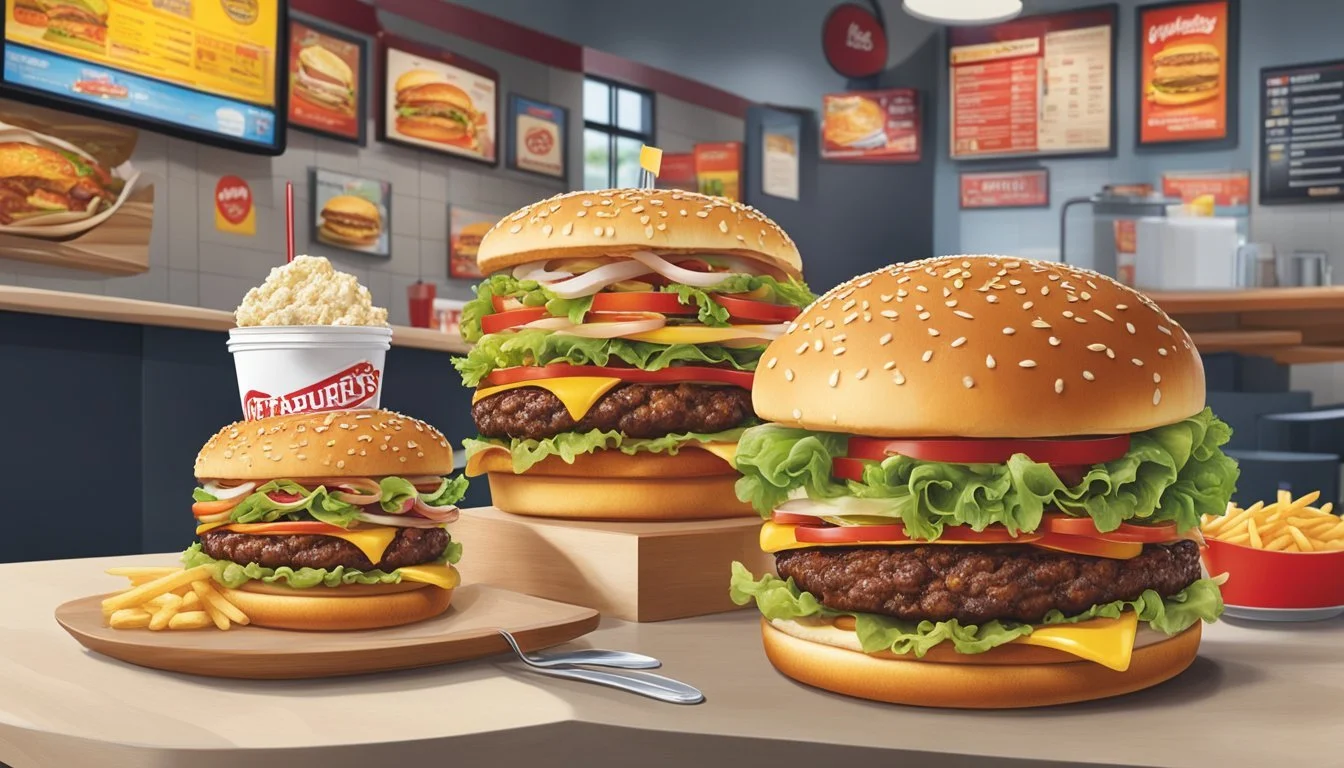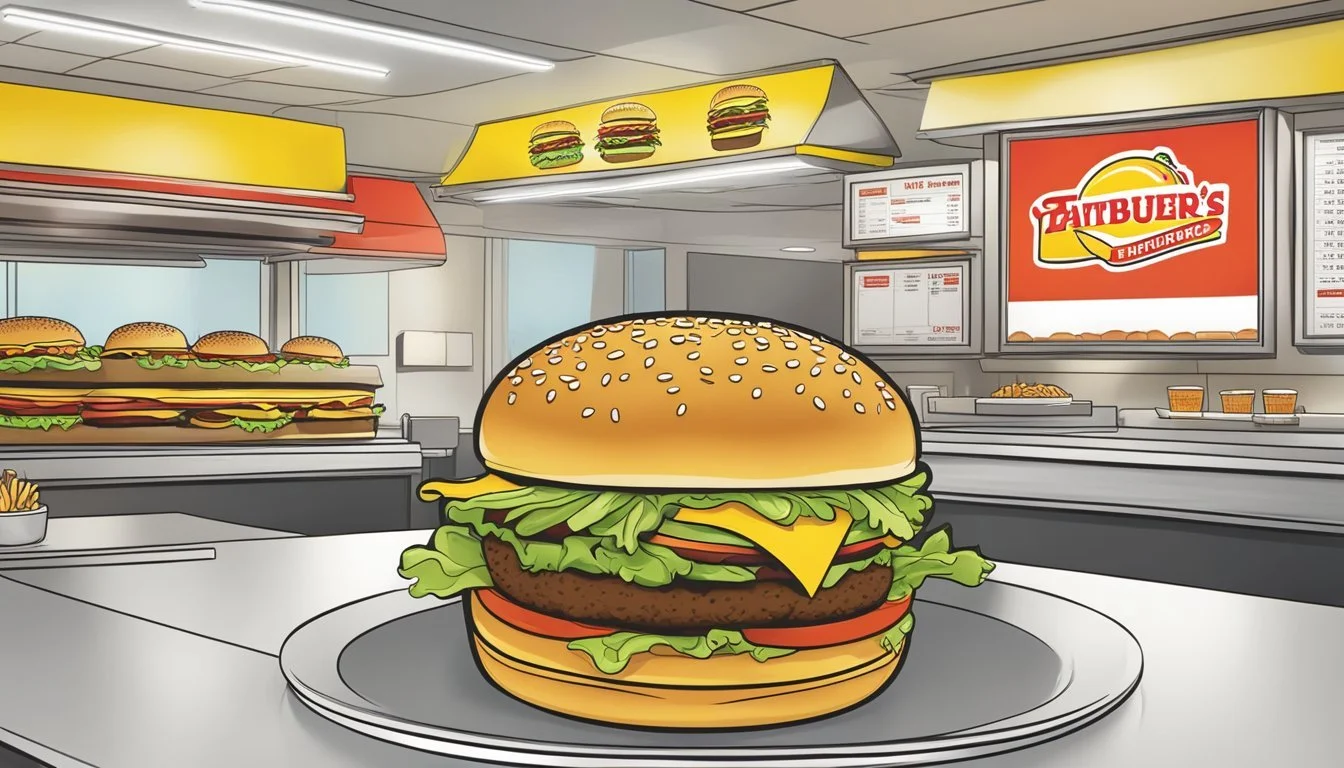Wendy's vs Fatburger
A Comparison of Burger Quality and Value
When it comes to fast-food burgers, the debate over which chain serves the best one is fierce. Wendy's and Fatburger are two establishments often brought up in this conversation, each with its own devoted fan base and distinct approach to crafting the iconic American sandwich. Wendy's, known for its square hamburger patties that hang over the bun, has positioned itself as a fresh, never frozen beef provider, appealing to those seeking a more "home-cooked" style. On the other hand, Fatburger prides itself on delivering a more gourmet experience, offering build-your-own burger options and touting the freshness and size variety of their offerings.
Both Wendy's and Fatburger have factors that appeal to different demographics. In terms of accessibility, Wendy's has a broader reach with a substantial international presence, allowing for a wider range of people to taste their offerings. Conversely, Fatburger, with fewer locations, focuses on the quality of each visit, emphasizing more personalized burgers that cater to individual preferences.
The competition between Wendy's and Fatburger encapsulates greater trends in the fast-food industry, reflecting the spectrum between efficiency and customization. Consumers value Wendy's for their consistent quality and quick service model, while Fatburger aficionados appreciate the brand's attention to detail and the ability to tailor their meal. The comparison between these two chains ultimately boils down to more than just taste; it includes considerations of service speed, burger customization, and the overall dining experience.
History and Brand Evolution
The journey of Wendy's and Fatburger across the American fast-food landscape tells a tale of distinctive branding and market adaptation. Both chains have carved out their niches and boast a loyal customer base, reflecting their unique heritage and evolution.
Wendy's Heritage
Wendy's, known for its square-shaped burgers and the iconic Frosty, began its story in 1969 when Dave Thomas opened the first location in Columbus, Ohio. As a contrast to the competition, Thomas banked on the fresh, never frozen beef and quick service with a homemade taste. Wendy's quickly became synonymous with quality in the burgeoning fast-food market of America. The brand's logo, featuring a portrait of Thomas's daughter, Wendy, reflects the personal touch the company strives to include in every meal.
Fatburger's Origins
On the other hand, Fatburger started out in 1947 as a small hamburger stand in Los Angeles, California, founded by Lovie Yancey. She aimed to create a burger joint that didn't skimp on quality or size, branding the product as a 'huge hamburger'. Fatburger's menu boasts lean beef and a wide array of customizable toppings, offering a unique take on the classic American burger. With a strong following in the West Coast, the chain has maintained a presence in the market through fresh, made-to-order burgers and a casual, diner-esque atmosphere.
Menu Diversity and Offerings
Wendy's and Fatburger stand out in the fast-food industry with their signature burgers and variety of side offerings, each catering to a range of dietary preferences including vegetarian options.
Signature Burgers
Wendy's prides itself on a selection of hamburgers featuring square-shaped beef patties which are never frozen, and the iconic Dave's Single leads the pack. It includes a quarter pound of fresh beef, American cheese, crisp lettuce, tomato, pickle, ketchup, mayo, and onion on a toasted bun. On the other hand, Fatburger's eponymous Fatburger is the star of their menu, boasting a 100% beef patty, lettuce, onion, tomato, pickles, relish, mayonnaise, and mustard on a toasted bun. Both establishments offer customization options that allow customers to include additional toppings such as jalapeños and grilled mushrooms.
Side Dishes and Alternatives
In addition to burgers, both restaurants offer a variety of side dishes. Wendy's is known for their sea-salted fries and crispy chicken nuggets, while Fatburger offers homemade onion rings as an alternative to fries. Both provide a selection of other items such as chicken sandwiches and hot dogs, ensuring there's something for every fast-food enthusiast.
Vegetarian and Vegan Options
Wendy's accommodates non-meat eaters with items like the Garden Side Salad and baked potatoes, while Fatburger steps up with the Impossible Burger, a plant-based burger designed to satisfy vegan and vegetarian tastes. Vegetables such as lettuce, tomatoes, onions, and pickles are staple options that can be included in most meals, ensuring a versatile menu for those avoiding meat.
Food Quality and Taste
When comparing Wendy's and Fatburger, an in-depth look at the burger patty quality, ingredient freshness, and flavor profiles is essential to determine which burger joint stands out.
Burger Patty Excellence
Wendy's highlights its signature square beef patties, which are marketed as never frozen and appear to maintain a more natural beef flavor. They offer a single, double, or triple patty option, allowing customers to choose their preferred beefiness. Fatburger, on the other hand, stresses the lean aspect of its titular offering, the Fatburger, suggesting a healthier take on the traditional fast-food beef patty. Both establishments showcase a commitment to beef patty quality, but their approaches cater to different customer preferences for burger size and health consciousness.
Freshness of Ingredients
Fresh ingredients are paramount at both Wendy's and Fatburger. Wendy's often emphasizes the use of fresh, not frozen beef, and crisp produce to appeal to those looking for a fresher, less processed burger. Similarly, Fatburger prides itself on made-to-order burgers with ingredients that are prepared fresh. The customer can perceive the attention to freshness in the crunch of the lettuce and the ripe juiciness of the tomatoes.
Flavor Profiles
The burgers at Wendy's and Fatburger boast flavor profiles designed to satisfy a range of taste preferences. Wendy's offers a variety of flavorful toppings and condiments, including the option to add slices of applewood smoked bacon, which notably enhances the savory aspect of their burgers. Fatburger allows customers to personalize their burgers extensively, with toppings like relish and tangy sauces that contribute a tantalizing complexity to their burgers. American cheese is a popular addition at both, melting into the patties and complementing the flavor profile with a creamy, rich texture.
Nutritional Information
When comparing Wendy's and Fatburger, the nutritional content of their burgers can be instrumental in determining the better choice for health-conscious individuals. The focus here will be on comparing the caloric content and highlighting healthier dining options available at both establishments.
Caloric Content Comparison
Wendy's burgers typically range in calories from a simple hamburger at around 250 calories to more indulgent options that can exceed 600 calories. On the other hand, Fatburger offers a range of burgers starting from the small Original Fatburger at approximately 400 calories to larger burgers that can contain over 800 calories.
Wendy's Hamburger:
Calories: 250
Fatburger Original (Small):
Calories: 400
Healthier Dining Options
Both burger joints cater to health-centered diners by providing a variety of options. Wendy's includes options like salads and grilled chicken sandwiches, while Fatburger offers a veggie burger suitable for those looking for a lower-calorie or vegan option.
Wendy's:
Grilled Chicken Sandwich: Lower in calories and high in protein.
Salads: Fresh options available with an assortment of toppings.
Fatburger:
Veggie Burger: A vegan alternative with fewer calories and less fat than traditional beef burgers.
Turkey Burger: A leaner protein choice for those looking to cut red meat from their diet.
Both restaurants provide nutritional information for their menu items, allowing guests to make informed choices based on their dietary goals or restrictions.
Pricing and Value for Money
When evaluating Wendy's and Fatburger, one must carefully consider the pricing structures and the value for money offered by each burger joint. Customers often look for an affordable yet satisfying meal, so how these chains price their products and what deals they offer can influence consumer choice.
Cost Comparisons
Wendy's positions itself as a purveyor of fairly priced burgers, with options such as the Double Stack providing a filling meal at a competitive cost. For instance, their bacon, egg, and cheese biscuit is priced at approximately $3.19, which contrasts with burger offerings from competitors that may have higher price points for similar items.
Fatburger, on the other hand, titles their signature offering as the Fatburger, which features lean beef and a variety of toppings. Prices at Fatburger can vary by location, but the chain is known for its substantial sized burgers that are often perceived as premium, both in quality and cost.
Value Meals and Deals
Wendy's:
Offers a range of value meals that typically combine a burger, fries, and a drink.
Promotions like the 4 for $4 deal, where customers can get a selection of items including a Double Stack, nuggets, fries, and a drink, exemplify their pursuit of providing value.
Fatburger:
While not as famous for value deals, they offer meal combinations that include their burgers, sides, and a drink.
Fatburger's meal prices reflect not just the food but also the brand's premium market positioning, which customers might associate with a higher value proposition.
Both Wendy's and Fatburger offer different approaches to pricing and value. Wendy's tends to lean towards more competitively priced options and value deals, catering to customers seeking a quick and cheap meal that remains satisfying. Fatburger tends to focus more on the burger experience, with a price point that suggests a premium product.
Customer Experience and Service
When evaluating Wendy's and Fatburger, it is essential to consider the differences in customer experience and service, as these factors greatly influence diner satisfaction.
Service Speed
Wendy's typically prioritizes a fast service model, aiming to deliver orders promptly, usually within minutes of ordering. The chain's efficiency is aided by a streamlined menu and a well-honed operating system. In contrast, Fatburger, which promotes a more made-to-order approach, may take a longer time to serve up its burgers, resulting in a slight trade-off between speed and customization.
Atmosphere and Cleanliness
Wendy's offers a modern and clean dining environment with a consistent ambiance across its locations. Regular renovations and updates are part of Wendy's commitment to maintaining a welcoming atmosphere. Fatburger's setup varies more widely, with some locations exuding a retro diner feel and others featuring more contemporary designs. Both brands generally enforce strict cleanliness standards, although individual experiences can vary by location.
Staff and Customer Satisfaction
The staff at both Wendy's and Fatburger are trained to provide friendly customer service. Wendy's employees are often noted for their speed and efficiency, while Fatburger's staff is recognized for their attentiveness to custom orders. Customer satisfaction can hinge on the individual interactions with staff, but both Wendy's and Fatburger typically receive praise for their service.
Brand Presence and Market Position
Wendy's and Fatburger compete in the dynamic landscape of the fast-food industry, where brand presence and market position are critical. Each brand leverages unique strategies and has carved out its own space within the sector, often benchmarking against heavyweights like McDonald's and Burger King.
Global Reach and Locations
Wendy's boasts an extensive global presence, with over 6,700 locations in 30 countries, successfully securing its spot as one of the world's largest quick-service restaurant chains. In contrast, Fatburger, a smaller but respected player in the market, operates in approximately 20 countries, providing a boutique alternative to the mega-chains. The brand's reach is echoed in its competitive set, with its peers such as Burger King and McDonald's hosting expansive international locations, further intensifying competition.
Marketing Strategies
Wendy's marketing efforts are robust, characterized by memorable campaigns and a mix of product diversity that appeals to various customer preferences. They offer a range of products including signature items like their square-shaped burgers—competing directly with traditional offerings from chains like A&W and Sonic. On the other hand, Fatburger's strategies often emphasize their fresh-never-frozen beef, targeting customers that might gravitate towards alternatives like Smashburger or Five Guys. Meanwhile, giants like McDonald's constantly innovate with both product and marketing, with items like the Big Mac becoming cultural touchstones.
Competitive Analysis
In terms of market share, Wendy's stands strong against rivals such as Burger King, with its sales eclipsing that of its long-term competitor. Fatburger, positioned as a fast-casual restaurant, faces different market dynamics against chains like Shake Shack or In-N-Out. With an emphasis on higher-quality ingredients, Fatburger aligns itself with consumers who are willing to pay slightly more, compared to Wendy's traditional fast-food cost-efficiency. Companies like McDonald's, Burger King, and Dairy Queen remain pivotal players in the analysis, as their widespread consumer base and long-standing brand recognition pose ongoing challenges for both Wendy's and Fatburger.
Through strategic location expansion, targeted marketing, and a clear understanding of their competitive landscape, Wendy's and Fatburger maintain their relevance in a saturated market that continues to evolve.
Public Perception and Reviews
In assessing Wendy's and Fatburger, consumer ratings and feedback alongside industry accolades shape the public's perception of these fast-food burger establishments.
Consumer Ratings and Feedback
Wendy's and Fatburger both receive significant attention in the fast-food burger market, with opinions widely varying among consumers. Wendy's typically capitalizes on its reputation for freshness, often highlighted by customers who appreciate the "never frozen" beef promise. On review platforms and social media, Wendy's burgers are generally praised for their flavor and the variety of options available. In particular, the Baconator receives frequent mentions for its satisfying composition of bacon and beef.
Contrastingly, Fatburger enjoys a cult following in areas where it operates, with patrons commending its customizable burger experience. Guests value the chance to select from a range of fresh toppings, something that aligns with the 'build your own burger' trend. Consumer feedback often cites the Fatburger as a heftier, indulgent option, which consumers find appealing when looking for a more filling meal.
Special Accolades and Awards
While direct comparisons in awards are scarce because such accolades often vary by region and are issued by different organizations, both Wendy's and Fatburger have been noticed in the industry for their distinctive qualities.
Wendy's: Has been acknowledged for its marketing campaigns and social media presence with awards that highlight the company's innovative approach to engaging with customers.
Fatburger: Compared less frequently on the larger fast-food scales, it prides itself on local recognition and the unique achievement of being a crowd favorite in the places it operates, often winning local 'best burger' competitions.
Innovation and Future Outlook
Wendy's and Fatburger are evolving with an eye towards the future, focusing on menu innovation, sustainability, and expansion plans.
Recent Upgrades to Menus
Wendy's has introduced a new kitchen model called the Global Next Gen High-Capacity Kitchen, which is estimated to deliver a nearly 50 percent increase in kitchen output. They are also expanding their menu offerings, although specific details on new items are not provided.
Fatburger has not been static either. Known for its traditional offerings, Fatburger has paid attention to evolving consumer preferences by incorporating options like the Impossible Burger, catering to the growing demand for plant-based, vegan-friendly options.
Sustainability Efforts
In the sustainability arena, both chains have made conscious efforts to reduce their environmental footprints. Wendy's sustainability initiatives are centered around reducing waste and improving packaging, but more specific details on their strategies are necessary for a comprehensive comparison.
Fatburger has also demonstrated an awareness of sustainability, particularly through the offering of vegan products like the Impossible Burger, which caters to both dietary preferences and a reduced environmental impact associated with plant-based proteins.
Expansion Plans
Wendy's has announced aggressive expansion plans with the goal to open 200 Global Next Gen units by the end of 2024. These Global Next Gen restaurants have a new high-capacity kitchen design to cater to the highest customer demand, signifying both growth in the physical footprint and advancements in operational efficiency.
Fatburger's expansion plans are not detailed in the provided search results, suggesting that the chain might focus more on consolidating and enhancing its current operations rather than extensive expansion.
Conclusion
When comparing Wendy's and Fatburger, consumers have distinct choices. Wendy's is renowned for its square beef patties which arguably stand out in the fast-food landscape. They offer a variety of options including the classic Wendy's single, double, and Baconator. Additionally, Wendy's is well-known for their side options and frosty desserts.
In contrast, Fatburger caters to those who prefer customizable burgers. Their signature Fatburger is accompanied by a selection of free toppings that allow for a personalized experience. They pride themselves on using lean beef, which may appeal to health-conscious diners.
Fatburger's Strengths:
Customizable burgers with a wide range of toppings
Uses lean beef in their patties
Wendy's Strengths:
Recognizable square beef patties
Broad menu including notable sides and desserts
One's preference might boil down to prioritizing customization or opting for the distinctive square patties and varied menu Wendy's provides. Both establishments have their own appeal, and the choice is inherently subjective.
In terms of a recommendation, consumers seeking a tailored burger experience may lean towards Fatburger. Alternatively, those who value a broader menu with familiar flavors may find Wendy's to be the preferable choice. It's ultimately up to the individual's taste preference and dining priorities. Each brand brings a strong representation in the burger joint arena, with unique offerings that cater to different culinary desires.









